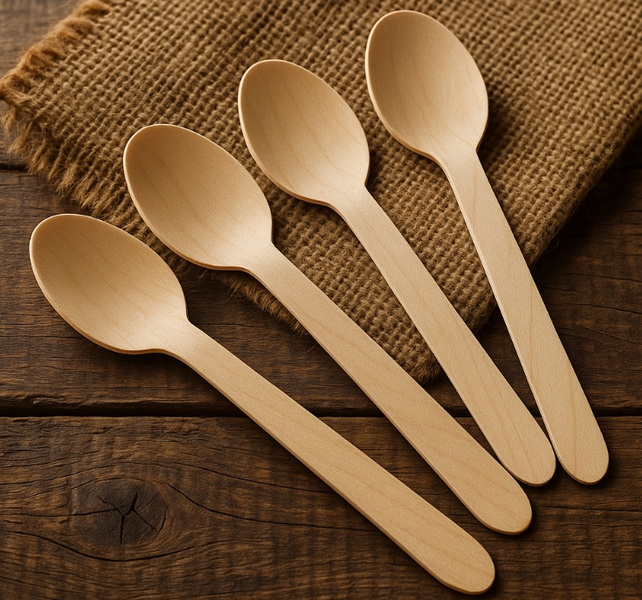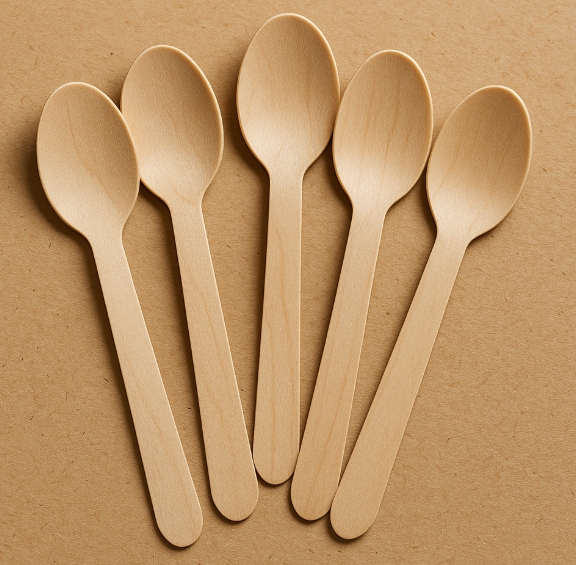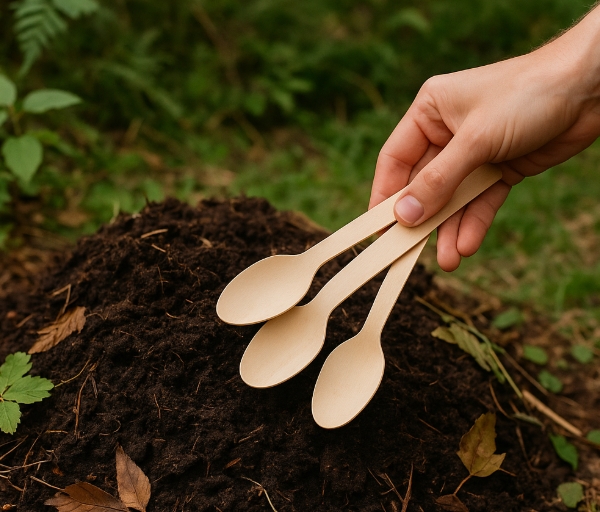
Content Menu
● What Is a Wooden Disposable Spoon?
● The Eco-Friendly Nature of Wooden Disposable Spoons
>> Renewable Resource Utilization
>> Lower Carbon Footprint
>> Absence of Harmful Chemicals
>> Minimal Environmental Impact
● Biodegradability of Wooden Disposable Spoons
>> Natural Decomposition Process
>> Compostability
>> Landfill Considerations
● Comparing Wooden Disposable Spoons to Plastic Utensils
● Safety and Hygiene Considerations
>> Food Safety
>> Hygiene Practices
>> Single-Use Design
● Sourcing and Certifications
>> Sustainable Forestry
>> Manufacturing Standards
● Practical Advantages of Wooden Disposable Spoons
>> Versatility and Strength
>> Aesthetic Appeal
>> Convenience
● Limitations and Considerations
>> Single-Use Nature
>> Potential for Splintering
>> Cost
● The Lifecycle of a Wooden Disposable Spoon
● How to Maximize the Benefits of Wooden Disposable Spoons
● Conclusion
● Frequently Asked Questions (FAQ)
>> 1. Are wooden disposable spoons really biodegradable?
>> 2. Can wooden disposable spoons be composted at home?
>> 3. Are wooden disposable spoons safe for hot foods?
>> 4. Is it safe to reuse a wooden disposable spoon?
>> 5. Do wooden disposable spoons contribute to deforestation?
As the world becomes increasingly conscious of environmental issues, the demand for sustainable alternatives to single-use plastics is on the rise. Among these alternatives, the wooden disposable spoon has gained significant popularity. But are these utensils truly eco-friendly and biodegradable, or are they simply a trend? This article delves deep into the lifecycle, environmental impact, and practical considerations of wooden disposable spoons, providing you with a comprehensive understanding of their place in a sustainable future.

What Is a Wooden Disposable Spoon?
A wooden disposable spoon is a single-use utensil crafted from natural wood, such as birch, beech, or bamboo. Unlike plastic spoons, which are derived from petroleum-based materials, wooden disposable spoons are made from renewable resources. Their natural appearance, sturdy feel, and biodegradability make them a favorite for eco-conscious consumers, event planners, and businesses seeking greener options.
The Eco-Friendly Nature of Wooden Disposable Spoons
Renewable Resource Utilization
One of the primary reasons wooden disposable spoons are considered eco-friendly is their source material. Wood is a renewable resource, meaning it can be replenished through responsible forestry practices. When manufacturers use wood from sustainably managed forests, they help ensure that the ecosystem remains balanced and that future generations will have access to these resources.
Lower Carbon Footprint
The production process for a wooden disposable spoon generally involves less energy and fewer greenhouse gas emissions compared to plastic alternatives. Wood absorbs carbon dioxide as it grows, and the manufacturing process does not require the high temperatures or chemical treatments necessary for plastics. This results in a lower overall carbon footprint, making wooden disposable spoons a better choice for those aiming to reduce their environmental impact.
Absence of Harmful Chemicals
Unlike some plastic utensils, which can leach toxic substances into food and the environment, a wooden disposable spoon is typically free from harmful chemicals, coatings, or dyes. This natural composition makes them safer for both consumers and the planet.
Minimal Environmental Impact
When disposed of properly, wooden disposable spoons return to the earth without leaving behind microplastics or toxic residues. Their impact on wildlife and ecosystems is minimal compared to plastic utensils, which often end up polluting oceans and harming marine life.
Biodegradability of Wooden Disposable Spoons
Natural Decomposition Process
A key advantage of the wooden disposable spoon is its ability to break down naturally. When exposed to the right conditions-moisture, oxygen, and microorganisms-wooden spoons decompose over time, turning into organic matter that enriches the soil. This process is much faster and cleaner than the decomposition of plastic, which can take hundreds of years and release harmful substances.
Compostability
Wooden disposable spoons are compostable in both home and industrial composting systems. When added to a compost pile, they break down alongside food scraps and yard waste, eventually becoming nutrient-rich compost that can be used to nourish plants. This closed-loop system is a significant advantage over plastic utensils, which typically end up in landfills.
Landfill Considerations
Even if a wooden disposable spoon ends up in a landfill, it will still decompose much faster than a plastic spoon. However, composting is always the preferred disposal method, as landfills often lack the oxygen needed for efficient decomposition, which can slow the process and produce methane gas.
Comparing Wooden Disposable Spoons to Plastic Utensils
| Feature | Wooden Disposable Spoon | Plastic Spoon |
| Resource | Renewable (wood) | Non-renewable (petroleum) |
| Biodegradability | Biodegradable and compostable | Not biodegradable |
| Chemical Safety | No toxic leaching | May leach chemicals |
| Carbon Footprint | Lower | Higher |
| Durability | Sturdy, but single-use | Often more durable |
| Environmental Impact | Minimal if sourced well | High, persistent pollution |
Wooden disposable spoons are clearly a more sustainable and eco-friendly choice compared to their plastic counterparts.
Safety and Hygiene Considerations
Food Safety
A wooden disposable spoon is safe for food contact, provided it is manufactured from food-grade materials and processed under hygienic conditions. Reputable manufacturers ensure that their spoons are free from harmful chemicals and coatings, making them suitable for both hot and cold foods.
Hygiene Practices
While wooden disposable spoons are designed for single use, proper storage and handling are essential to maintain hygiene. Spoons should be kept in a dry, sealed environment to prevent mold or bacterial growth. It is also important to inspect spoons for any signs of damage or contamination before use.
Single-Use Design
Although it may be tempting to reuse a wooden disposable spoon, this is not recommended. Wood is a porous material that can absorb moisture and bacteria from food, making it difficult to clean thoroughly. Reusing wooden spoons can compromise both hygiene and structural integrity.

Sourcing and Certifications
Sustainable Forestry
The environmental benefits of a wooden disposable spoon depend heavily on responsible sourcing. Look for products that carry certifications such as the Forest Stewardship Council (FSC), which ensures that the wood comes from sustainably managed forests. This helps protect biodiversity and prevents deforestation.
Manufacturing Standards
Reputable manufacturers adhere to strict food safety and environmental standards. Choosing wooden disposable spoons from trusted brands or suppliers increases the likelihood of getting a product that is both safe and environmentally responsible.
Practical Advantages of Wooden Disposable Spoons
Versatility and Strength
A wooden disposable spoon is sturdy enough for a wide range of foods, including soups, salads, and desserts. Unlike some plastic utensils, wooden spoons do not bend or melt when exposed to heat, making them reliable for various occasions.
Aesthetic Appeal
The natural look and feel of wood add a touch of elegance and rustic charm to any table setting. Wooden disposable spoons are often chosen for weddings, parties, and upscale events because of their attractive appearance.
Convenience
After use, wooden disposable spoons can be composted or disposed of with minimal environmental guilt. Their convenience is matched by their sustainability, making them an excellent choice for picnics, catering, and takeout.
Limitations and Considerations
Single-Use Nature
While wooden disposable spoons are more eco-friendly than plastic, they are still single-use items. Reducing overall waste remains important, so reusable options should be considered when possible.
Potential for Splintering
Lower-quality wooden spoons may splinter or break, so it is important to select products from reputable sources that ensure smooth finishes and durability.
Cost
Wooden disposable spoons can be more expensive than plastic utensils, reflecting the cost of sustainable sourcing and production. However, many consumers view this as a worthwhile investment for the environment.
The Lifecycle of a Wooden Disposable Spoon
1. Harvesting: Trees are harvested from sustainably managed forests.
2. Manufacturing: Wood is processed, shaped, and finished into spoons.
3. Distribution: Spoons are packaged and shipped to retailers or end users.
4. Use: Spoons are used for eating, often at events or with takeout.
5. Disposal: After use, spoons are composted or disposed of; they biodegrade naturally.
How to Maximize the Benefits of Wooden Disposable Spoons
- Choose Certified Products: Look for FSC or similar certifications to ensure responsible sourcing.
- Compost After Use: Composting maximizes environmental benefits and returns nutrients to the soil.
- Avoid Reuse: Use each spoon only once to maintain hygiene and biodegradability.
- Support Responsible Brands: Purchase from companies committed to sustainability and ethical practices.
Conclusion
The wooden disposable spoon stands out as an eco-friendly and biodegradable alternative to plastic cutlery. Made from renewable resources and designed to break down naturally, these spoons offer a sustainable solution for single-use dining needs. While they are not perfect-being single-use and sometimes more costly-their environmental advantages are clear. By choosing certified, responsibly sourced wooden disposable spoons and disposing of them properly, consumers can significantly reduce their ecological footprint and support a healthier planet.

Frequently Asked Questions (FAQ)
1. Are wooden disposable spoons really biodegradable?
Yes, wooden disposable spoons are biodegradable. They break down naturally over time, especially when composted, returning nutrients to the soil without leaving toxic residues. This makes them a much more sustainable option compared to plastic utensils.
2. Can wooden disposable spoons be composted at home?
Absolutely. Most wooden disposable spoons can be composted in both home and industrial composting systems. Just make sure they are free from coatings or contaminants before adding them to your compost pile.
3. Are wooden disposable spoons safe for hot foods?
Yes, wooden disposable spoons are heat-resistant and suitable for both hot and cold foods. They do not melt or leach chemicals when exposed to heat, unlike some plastic utensils, making them a safe and reliable choice for serving soups, stews, and hot beverages.
4. Is it safe to reuse a wooden disposable spoon?
No, reusing wooden disposable spoons is not recommended. Wood is porous and can absorb moisture and bacteria, making it difficult to clean thoroughly. For hygiene and safety reasons, it is best to use each spoon only once.
5. Do wooden disposable spoons contribute to deforestation?
When sourced from sustainably managed forests, wooden disposable spoons do not contribute to deforestation. Look for products with certifications such as FSC to ensure that the wood is harvested in an environmentally responsible manner.

















